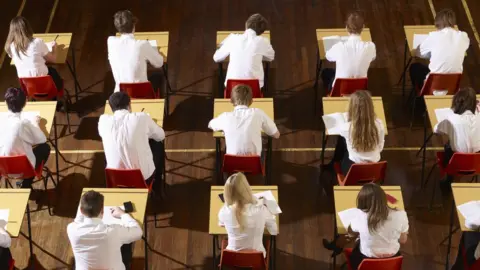Scottish exam results: What happens next?
 Getty Images
Getty ImagesStudents across Scotland are finding out their National 5, Higher and Advanced Higher exam results.
This year was the first time that formal exams were held since the Covid pandemic began in 2020, with more than two million papers being collected from 500 schools, colleges and training centres.
How will I get my results?
Results are being delivered by post and some students have signed up with MySQA to also receive their grades by text or email rather than face the anxious wait for them to drop through the letterbox.
Schools will also receive pupils results, as will any universities or colleges they have applied to through Ucas.
If pupils don't receive your certificate on results day, they can contact their school who will be able to tell them their results.
How have grades been decided this year?
Exams were cancelled in 2020 because of Covid, with teacher estimates being used to determine grades, and again last year when in-school assessments replaced traditional exams.
Pupils were allowed to sit exams this year, with the Scottish Qualification Authority (SQA) saying it will take a more generous approach to grading because of the amount of disruption young people have faced.
The National 4 qualification is based on continuous assessment, with each unit that makes up the course marked as pass or fail.
Courses at National 5, Higher, and Advanced Higher are graded between A and D, with anyone who scores less than 40% receiving a "no award" result.
If a pupils fails a course, it is possible to repeat it next year.
Can I appeal my results?
 Getty Images
Getty ImagesSchools, colleges and training centres submit estimated grades for each student to the SQA before they sit exams.
You can appeal to the SQA either directly or through your school or college if your final grade is lower than this estimate.
If your appeal request is accepted, the SQA will look at your exam paper and assignments to ensure it was marked and recorded correctly, and review any other evidence that is sent on your behalf before deciding whether or not to award you a higher grade.
An appeal can be prioritised if you have a conditional place at university or college, or are in training or employment that depends on your grade.
The deadline for priority appeals is 16 August, or 30 August for other appeals. Decisions on priority appeals will be sent to schools and colleges on 5 September, with the results of all other appeals likely to be issued at the end of October.
What happens if I don't get the grades I need?
A telephone advice line will be available on weekdays between 9 and 16 August that you can call for advice after receiving your results.
If you narrowly missed out on the grades you needed to study a particular subject at university or college, their admissions office may have some flexibility, or might suggest a different course.
You can also apply to Ucas' clearing process, which is how universities and colleges fill empty places.
If you're not already holding an offer from a university or college, and the course still has room, you can apply through clearing until 18 October.
Alternatively, you can consider an apprenticeship or a traineeship. There are also entry-level jobs for those who want to go straight into work.
You could also potentially take a gap year to give you more time to decide which direction you want to follow.
What if I'm struggling to cope?
Receiving your results can be stressful and it is important to look after your mental health and wellbeing.
Talking to a trusted friend, family member, teacher or lecturer about how you're feeling can be a good first step and make a big difference.
You can find lots of information to help you relax and support your friends on the Young Scot and YoungMinds websites.
There are several other organisations that you can talk to, including:
